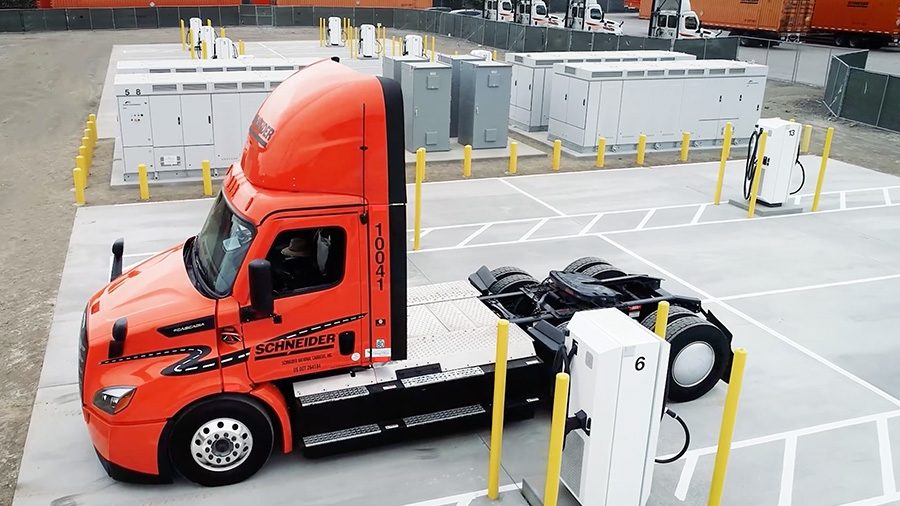Schneider says California site can charge 32 battery-powered trucks at once
Company will support fleet of 92 Freightliner eCascadia Class 8 trucks in metro Los Angeles area

The transportation, intermodal, and logistics services Schneider National Inc. has opened a large-scale, electric charging depot in California that will eventually support a fleet of nearly 100 battery-powered Class 8 trucks, the company said Wednesday.
The facility at Schneider’s South El Monte Intermodal Operations Center in Southern California is designed to power its fleet of Freightliner eCascadia battery electric trucks (BETs), which will be one of North America’s largest zero emission fleets. So far, the company has accepted delivery of approximately a third of its expected fleet.
The charging site features 16 350 kW dual-corded dispensers, allowing the carrier to charge 32 trucks simultaneously. At that power level, each eCascadia will be able to achieve an 80% charge of its 220-mile range within 90 minutes. The facility is central to the metro Los Angeles area and adjacent to major highways with a high density of customers within a 50-mile radius.
Already this year, Schneider has begun hauling deliveries for Frito-Lay North America and Goodyear using its new eCascadia fleet, supporting each companies’ supply chain sustainability goals.
The South El Monte site was funded through the Joint Electric Truck Scaling Initiative (JETSI), a project funded by state and local agencies to increase the number of zero emission heavy-duty trucks on the roads.
Funding for 50 of Schneider’s 92 BETs was made possible by JETSI, the first battery electric truck project jointly funded by the California Air Resources Board (CARB) and the California Energy Commission, which together awarded the project $27 million. Additional funding was provided by South Coast Air Quality Management District, Mobile Source Air Pollution Reduction Review Committee, the Port of Los Angeles, and Southern California Edison.
For the additional 42 trucks outside JETSI, five are jointly funded by the U.S. EPA FY18 Targeted Airshed Grant and Hybrid and Zero-Emission Truck and Bus Voucher Incentive Program (HVIP), seven are funded by the Volkswagen Environmental Mitigation Trust, and 30 trucks are funded by HVIP.
When fully operational, Schneider’s 92 BETs will have the potential to avoid more than 81,000 pounds of carbon dioxide emissions per day, the equivalent of removing 2,400 gas-powered cars from the road. Each day these zero emission trucks will accelerate the company’s progress toward its goal of reducing CO2 emission by 7.5% per mile by 2025 and a 60% per mile reduction by 2035.
The project follows other large-scale charging facilities in the state, such as last year’s launch by the real estate firm Prologis of two California sites that will allow Performance Team, a logistics provider owned by the ocean shipping giant Maersk, to simultaneously charge up to 38 of its Volvo VNR Electric Class 8 battery-electric trucks.
Related Articles
Copyright ©2024. All Rights ReservedDesign, CMS, Hosting & Web Development :: ePublishing